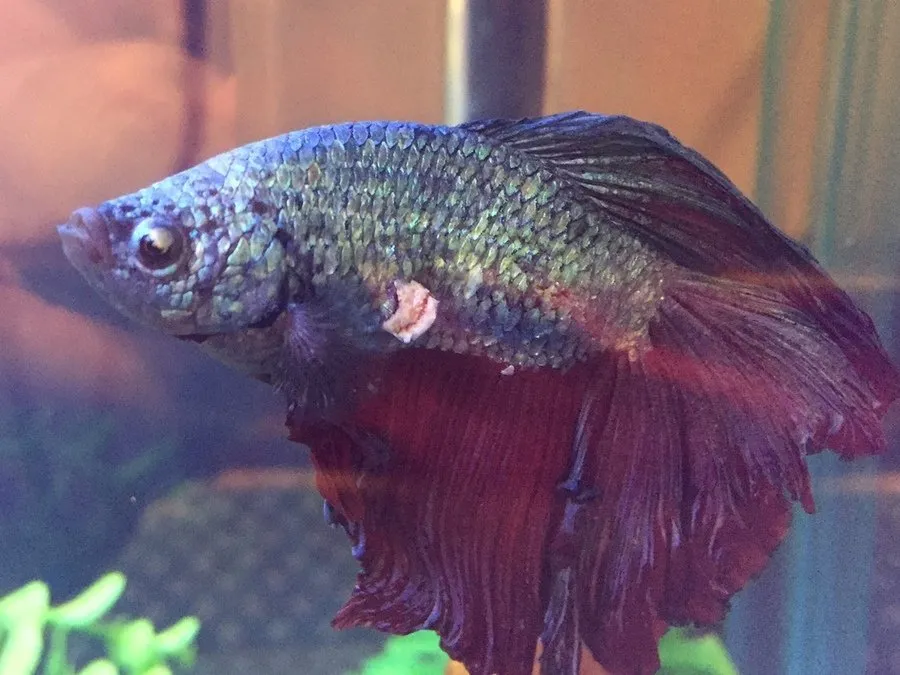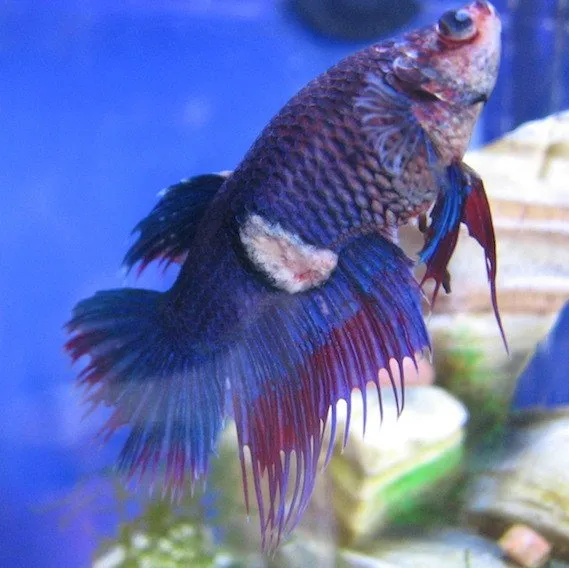
5 Possible Causes For A Betta Fish Ulcer

Writer at The Aquarium Keeper
Betta fish, also known as Siamese fighting fish, are widely popular due to their unique characteristics and vibrant colors. Unfortunately, like all animals, betta fish can suffer from various diseases that can cause distress or even death if left untreated. One of these diseases is an ulcer, which several factors can cause. This article discusses the causes of ulcers in betta fish, as well as possible treatments.
What is an Ulcer?
An ulcer is essentially an open sore spot on a betta fish. It can be pink or reddish in color, while also having whitish spots, resembling the dead skin of the betta fish. An ulcer can indicate, that a betta fish has a weak immune system. Some ulcers can even be deeper than others, even reaching the muscles or internal organs of the fish.

Ulcers are essentially bacteria breaching your betta fish’s immune system. Usually, the thick mucus, that covers the fish protects the skin from these kinds of problems, but a lot of different stressors from the betta fish habitat can affect the immune system of the betta fish, and it is likely, that it will develop ulcers on the skin.
Signs of Ulcers in Betta Fish
There are a lot of different signs, that your betta fish have an ulcer. Every betta fish can have different symptoms, but here are the most common ones:
- White patches or lesions on the body
- Broken skin
- Reddened areas on the skin
- Loss of appetite
- Sluggishness or lethargy
- Loss of mucus around the skin
- Exposed muscle or organs
- Pineconing
- Broken fins

If you do not treat your betta fish ulcer, it can develop more and more severe symptoms by the day. It is important to identify the cause of the problem, and then help your betta fish heal before the ulcer becomes more and more painful for the fish.
Can Ulcers be Fatal For Betta Fish?
In most cases, ulcers for betta fish are not fatal, since there are a couple of ways you can treat this problem. An ulcer can be fatal to a betta fish if it is left untreated, and the causes of the disease are not removed.
Your betta fish will gradually get worse and worse, before eventually passing away. An untreated ulcer can cause even more problems for the betta fish, like shredded fins, or even dropsy, because the immune system becomes extremely weak.
Ulcer Causes in Betta Fish
Moving on, there can be multiple possible causes of ulcers in betta fish. Most of these basic reasons are easily solvable and don’t require extensive knowledge or additional work. It only takes some examination of your current betta fish environment.
Bad Water Quality
Poor water quality can cause ulcers in betta fish. If the tank is not properly maintained with regular water changes and cleanings, it can simply be the main factor, why your betta fish develops ulcers. You should regularly test your water for ammonia and other toxins, and do weekly water changes. Here is a table for optimal water conditions for betta fish:
| Parameter | Optimal Range |
|---|---|
| Temperature | 78-80°F (25.5-26.5°C) |
| pH Level | 6.5-7.5 |
| Ammonia (NH3/NH4+) | 0 ppm |
| Nitrite (NO2-) | 0 ppm |
| Nitrate (NO3-) | < 20 ppm |
| Hardness (GH) | 2-10 dGH |
| Alkalinity (KH) | 2-6 dKH |
Poor water quality can be the reason for bad filtration (maybe the filter is not suited for that tank size, was not cleaned in a long time), overfeeding, overcrowding the tank, and not doing a proper aquarium nitrogen cycle before adding any fish.
Injuries
Betta fish can easily injure themselves in an aquarium. Sharp decorations, edges, or even rocks can cut your betta fish’s body or fins, which can weaken their immune system and eventually can lead to ulcers. Betta fish are sometimes clumsy swimmers, so even if you have no sharp things in the tank, they still might find a way to injure themselves.
Aggression
Betta fish can also be the victim of aggressive tank mates. Some people don’t know, what betta fish can be housed with, and make mistakes by keeping them with aggressive fish, or even other bettas in the same aquarium. Here is a list of certain species, that shouldn’t be kept with betta fish in the same tank:
- Other betta fish
- Tiger barbs
- Gouramis
- Cichlids
- Goldfish
- Pea puffers
- Reedfish
- Turtles
These species can easily hurt or injure your betta. Some are really territorial, while others just might see your betta fish as food. Be sure to avoid these fish when keeping betta fish.
Bacterial Infecion
Bacterial infections can be another cause of ulcers in betta fish. Most aquatic bacteria don’t affect fish until they find a way to beat their immune system.
If the water parameters are not good, the fish is experiencing a lot of stress, bacteria can then attack a betta fish, and eventually cause more harm and sickness. They can also be a reason for ulcers developing in bettas. Be sure to always keep good water parameters, and eliminate any stress causes.
Poor Nutrition
Another reason, why your betta fish might develop ulcers, is poor nutrition. If the fish does not get enough nutrients into their bodies, eventually their immune system can become weak enough for ulcers to develop. It is important to feed a betta proper food and understand the basic diet needs of betta fish.
You might also like to read: Can Betta Fish Eat Bread?
How to Cure Ulcers in Betta Fish
There are a few things that you can do to treat ulcers in betta fish. It is not a severe disease, and can easily be treated if you eliminate the problem, that caused the ulcers in the first place.
Eliminate Possible Causes
If the ulcer is not too large and not too deep, it can easily be treated by removing the root of the problem. Be sure to follow these steps, to maximize the chances to get rid of ulcers in your betta fish:
- Regularly test water quality with testing kits, and make sure, that the parameters are suited for your betta fish;
- Remove any unnecessary sharp decorations, rocks, or other things, that might accidentally injure your betta fish;
- Rehome any aggressive tank mates, that might cause stress or harm your betta fish;
- Regularly feed your betta fish carnivorous food (bloodworms, insect larvae, brine shrimp, protein flakes, pellets);
These basic steps mainly remove the reasons why your betta fish can get an ulcer. Be sure to regularly monitor your betta fish’s behavior and the appearance of their ulcer.
Antibiotics
If you can’t get the ulcer to go away with the measures mentioned above, you can try to see a fish veterinarian. Antibiotics can also be an alternative healing method for betta fish ulcers, but I would recommend seeing a specialist first, to get them prescribed, and to have the ulcer looked at by a professional.
Aquarium Salt Bath
You can also try and do an aquarium salt bath for your betta fish. It is a good way to kill parasites, bacteria and cure fin rot and other fungal infections. For the mildest dose, add 1 tablespoon per 3 gallons of water.
It is better, that you have another aquarium for the salt bath since the salt can affect negatively aquarium plants. Add your betta to the salt water for 15 minutes every day, and monitor the symptoms.
Frequently Asked Questions
Can Ulcers go Away on Their Own?
Usually, ulcers don’t go away on their own, because if nothing has been changed, the cause of the ulcer is still present. You need to find the root of the problem, to successfully get rid of ulcers from your fish.
Can Betta Fish Recover From Ulcers?
If the ulcer on betta fish is not too severe, in most cases it will make a full recovery. If the ulcer is left untreated and becomes too severe, the betta fish might die.
Writer's Thoughts
Betta fish are amazing species, but they easily become sick, if the conditions are not right. Ulcers are one of the easiest problems that can be cured, but you need to take some sort of action for them to go away.
If you enjoyed reading our article, please feel free to share it with your friends by clicking the social media buttons below:





